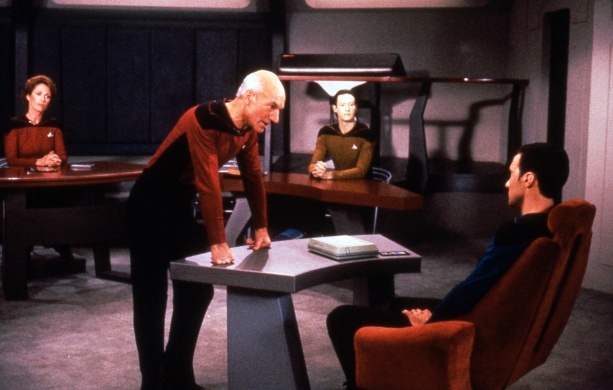After the premiere of Picard name checked Bruce Maddox, decided to head back and watch Measure of a Man, TNG S2E09.
And it turns out Maddox is a bit of a tech bro. Startling how well this holds up three decades later. This kind of guy is still a problem.
And it turns out Maddox is a bit of a tech bro. Startling how well this holds up three decades later. This kind of guy is still a problem.
As a refresher, The Measure of a Man was TNG at its hammiest, most thought provoking best.
A courtroom drama where the fate of Data hinges on the question of whether he is sentient being deserving of what we’d call basic “human rights.”
A courtroom drama where the fate of Data hinges on the question of whether he is sentient being deserving of what we’d call basic “human rights.”
After Riker delivers a devastating presentation that proves Data is an elaborate machine, Picard joins Guinan for a drink.
Guinan warns Picard that civilizations love nothing more than to create “disposable people,” to do the jobs no one else wants, with no recourse.
Guinan warns Picard that civilizations love nothing more than to create “disposable people,” to do the jobs no one else wants, with no recourse.
Guinan’s point is that by creating a special category that allows Data to be property by an arbitrary distinction, the Federation risks creating a permanent underclass.
This was the lever Picard needed—he wins the argument by appealing to Starfleet’s high mindedness.
This was the lever Picard needed—he wins the argument by appealing to Starfleet’s high mindedness.
This got me to thinking about Silicon Valley innovation.
Today, androids are far beyond our technological capabilities. So what the Valley did was build it lean.
Rather than building artificial laborers, the tech industry invented artificial supervisors.
Today, androids are far beyond our technological capabilities. So what the Valley did was build it lean.
Rather than building artificial laborers, the tech industry invented artificial supervisors.
When the algorithm determines who gets fired, when you work, what you get paid, and everything else about your daily life, there’s no limit to the cruelty of the workplace.
The human needs of the laborers are invisible to the software.
The human needs of the laborers are invisible to the software.
You don’t need to invent an entire android under this model, nor do you need to bear the costs of manufacture.
The software becomes an abstraction around real humans, but the owners of the business never need see them or interact with them in a supervisory context. Rows in a db.
The software becomes an abstraction around real humans, but the owners of the business never need see them or interact with them in a supervisory context. Rows in a db.
We’re left with “algorithmically disposable people.” Entirely commodified labor that can be discarded at will.
No one has to look them in the eye when they’re fired. No one need think of their kids or dependent parents.
No one has to worry about a thing—except the workers.
No one has to look them in the eye when they’re fired. No one need think of their kids or dependent parents.
No one has to worry about a thing—except the workers.
Gig workers are precarious not only because they lack benefits, but also because the everyday bedrock of their work is determined by a black box algorithm designed to extract maximum profit for a distant corporation.
They are raw material to be optimized.
They are raw material to be optimized.
And what is so dark about this is that the software is perfectly suited to this task.
Software perfectly shields the humans profiting from this one-sided equation from confronting the personal toll it takes on the algorithmically disposable people the company is chewing through.
Software perfectly shields the humans profiting from this one-sided equation from confronting the personal toll it takes on the algorithmically disposable people the company is chewing through.
One of the most striking parts of @MikeIsaac’s Super Pumped is how OPTIONAL it was for Uber management to interact with drivers.
They could hide away, pop out to interact with the drivers IF THEY WANTED, and go back into hiding again, and the machine kept working either way.
They could hide away, pop out to interact with the drivers IF THEY WANTED, and go back into hiding again, and the machine kept working either way.
This isn’t just a function of software.
This is also an outcome of an unequal economy. You can’t treat workers as disposable if they they have more appealing, more reliable, more humane alternatives.
The gig economy depends on economic desperation and limited opportunity.
This is also an outcome of an unequal economy. You can’t treat workers as disposable if they they have more appealing, more reliable, more humane alternatives.
The gig economy depends on economic desperation and limited opportunity.
So this isn’t JUST Silicon Valley’s fault. It’s a a symptom of an enormous broken system.
But it illustrates how this industry can use software to extract value from vulnerable populations with limited recourse.
We have a lot of work to do to make this right for people.
But it illustrates how this industry can use software to extract value from vulnerable populations with limited recourse.
We have a lot of work to do to make this right for people.
All of this is an inversion of the drama Star Trek imagined. But its warning is still important:
Automation can be used to hide our cruelty from view.
But we’re still responsible for it.
Automation can be used to hide our cruelty from view.
But we’re still responsible for it.
More on automated supervisors:
https://twitter.com/reckless/status/1233016951003320321">https://twitter.com/reckless/...
https://twitter.com/reckless/status/1233016951003320321">https://twitter.com/reckless/...

 Read on Twitter
Read on Twitter





